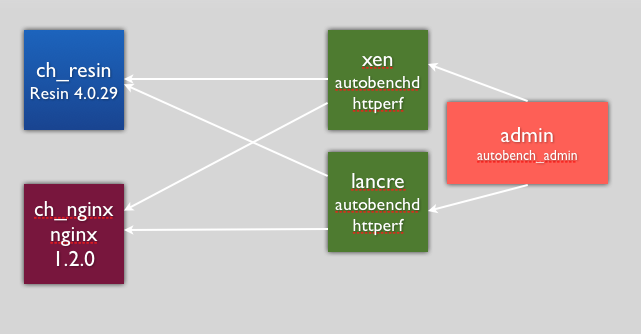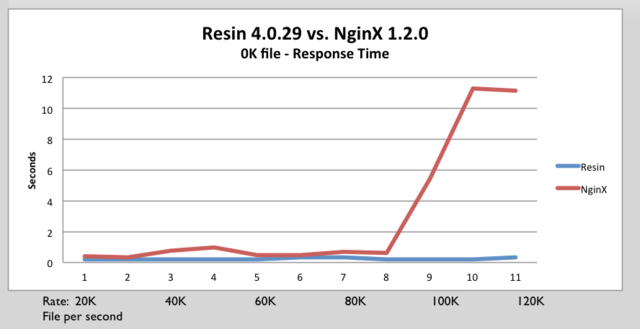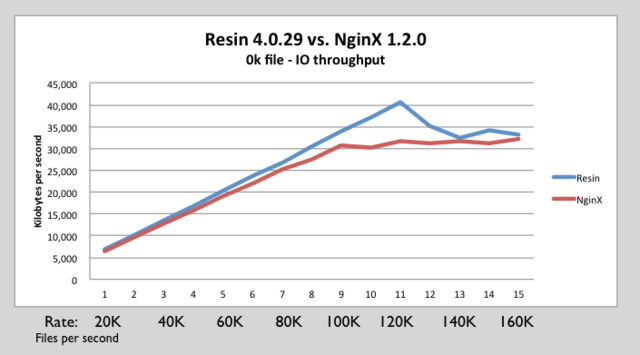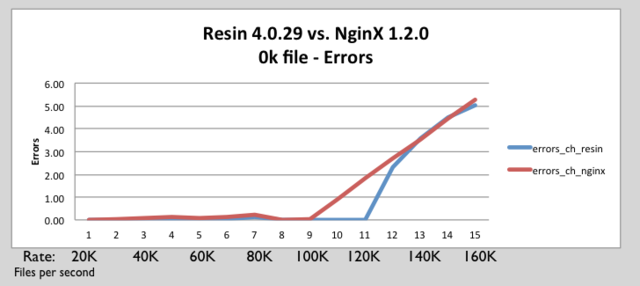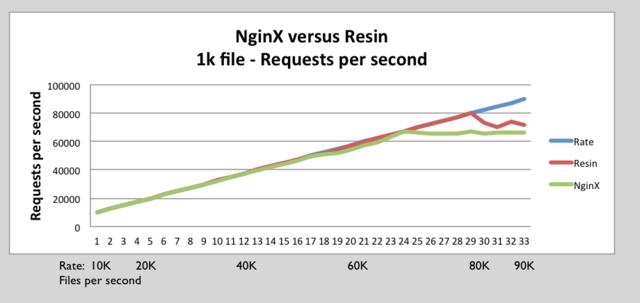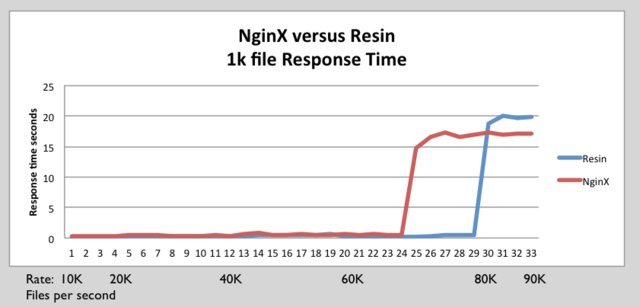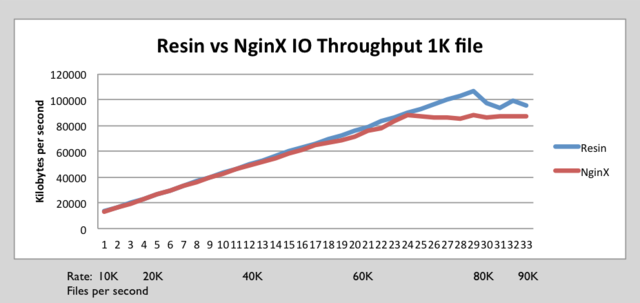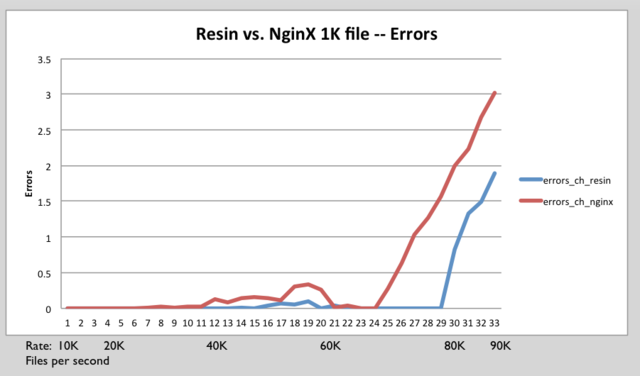NginX 1.2.0 versus Resin 4.0.29 performance tests
From Resin 4.0 Wiki
| Line 21: | Line 21: | ||
====Setup Overview==== | ====Setup Overview==== | ||
| − | + | [[Image:setup_benchmark_diagram.png]] | |
===Configuration=== | ===Configuration=== | ||
Revision as of 00:00, 14 August 2012
We have recently run some performance benchmarks comparing Resin 4.0.29 versus NginX 1.2.0. These benchmarks show that Resin Pro matches or exceeds NginX's throughput.
Contents |
Benchmark tools
The benchmark tests used the following tools:
- httperf
- AutoBench
httperf
httperf is tool produced by HP for measuring web server performance. The httperf tool supports HTTP/1.1 keepalives and SSL protocols.
AutoBench
Autobench is a tool for automating the process of performing a comparative benchmark test against two a web servers. Autobench uses httperf. Autobench runs httperf against each host. AutoBench increases the number of requests per seconds on each iteration. AutoBench delivers output in a format that can be easily consumed by spreadsheet tools. AutoBench has a mode where it can drive multiple clients against a set of servers to minimize the possibility of testing your client throughput instead of server throughput. The command autobenchd is used to run a daemon on client machines. The autobench_admin command drives many clients to run test at same time by communicating with autobenchd.
Setup Overview
Configuration
The only change that was made was the worker_processes were set to 8 for NginX to improve throughput.
Hardware Software Specifications
Client HW/OS specs:
- i7 4 core / 8 HT, 2.8 GHZ, 8Meg Cache, 8 GB RAM.
- Ubuntu 12 / Linux Kernel 3.2.0-26-generic
Server HW specs:
- i7 4 core / 8 HT, 2.8 GHZ, 8Meg Cache, 8 GB RAM.
- Ubuntu 12 / Linux Kernel 3.2.0-26-generic
Test software:
- Autobench 2.1.1
- httperf 0.9.0
Software under test:
- Resin Pro 4.0.29
- nginx 1.2.0
0k test
Command Line Arguments
0k.sh
./admin.sh 300000 2000 20000 1000 0k
admin.sh
autobench_admin --clients xen:4600,lancre:4600 --uri1 /file_$5.html --host1 ch_resin --port1 8080 --uri2 /file_$5.html --host2 ch_nginx --port2 80 --num_conn $1 --num_call 10 --low_rate $2 --high_rate $3 --rate_step $4 --timeout 3 --file out_con$1_start$2_end$3_step$4_$5.tsv
Above is used to setup 300,000 connections at a rate of 20,000 to 200,000 requests per second. Each iteration increases the rate by 10,000 from 20,000 to 200,000.
0k html file file_0k.html
<html> <body> <pre></pre> </body> </html>
0k full Results for 0K test
1K test
Command line
1k.sh
./admin.sh 200000 1000 10000 250 1k
admin.sh
autobench_admin --clients xen.caucho.com:4600,lancre.caucho.com:4600 --uri1 /file_$5.html --host1 ch_resin --port1 8080 --uri2 /file_$5.html --host2 ch_nginx --port2 80 --num_conn $1 --num_call 10 --low_rate $2 --high_rate $3 --rate_step $4 --timeout 3 --file out_con$1_start$2_end$3_step$4_$5.tsv
1k.html
html> <body> <pre> 0 0123456789 0123456789 0123456789 0123456789 0123456789 0123456789 0123456789 0123456789 0123456789 1 0123456789 0123456789 0123456789 0123456789 0123456789 0123456789 0123456789 0123456789 0123456789 2 0123456789 0123456789 0123456789 0123456789 0123456789 0123456789 0123456789 0123456789 0123456789 3 0123456789 0123456789 0123456789 0123456789 0123456789 0123456789 0123456789 0123456789 0123456789 4 0123456789 0123456789 0123456789 0123456789 0123456789 0123456789 0123456789 0123456789 0123456789 5 0123456789 0123456789 0123456789 0123456789 0123456789 0123456789 0123456789 0123456789 0123456789 6 0123456789 0123456789 0123456789 0123456789 0123456789 0123456789 0123456789 0123456789 0123456789 7 0123456789 0123456789 0123456789 0123456789 0123456789 0123456789 0123456789 0123456789 0123456789 8 0123456789 0123456789 0123456789 0123456789 0123456789 0123456789 0123456789 0123456789 0123456789 9 0123456789 0123456789 0123456789 0123456789 0123456789 0123456789 0123456789 0123456789 0123456789 </pre> </body> </html>
